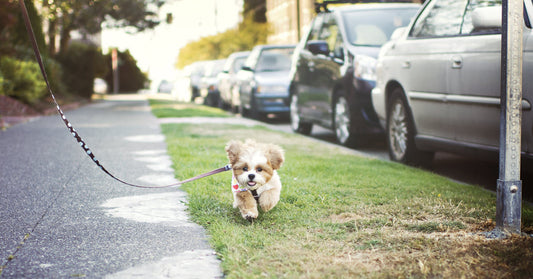One of your dog's favorite games to play is probably fetch. Whether you're throwing a ball, a stick, or a toy, he'll chase after it and drop it at your feet, again and again. It's great fun and great exercise too. If you love playing fetch with your dog, then you might be interested to know that dogs aren't the only animals that bring things back when they're thrown. It turns out, some wolf puppies love it too!
The Evolution of Dogs
We tend to think of wolves as fierce and independent, even dangerous creatures. However, wolves were the first animals to be domesticated, around 15,000 years ago by hunter-gatherers. When the wolves would go looking for food, they would sometimes follow humans around and eat the scraps they dropped, and a relationship was forged.
Exactly when and how they evolved into dogs is the subject of much debate, but it's believed that less aggressive wolves were given special attention and consideration, which allowed them to thrive and reproduce. Over many, many generations, this selective breeding led to the emergence of dogs.
Playing Fetch
Wolves and dogs are more different than people realize. Though they look very similar, thousands of years of evolutionary divergence has created differences in genetics, physical structure, and behavior as well. For instance, those millennia of domestication have made dogs much more in tune with human social cues.
It was always thought that's what fetching was - a human social cue that dogs have been conditioned to recognize and follow. However, recent experiments by Swedish behavioral scientists suggest there's more to it than that.
Christina Hansen Wheat of Stockholm University wanted to study the evolution of wolves into dogs and how it might have happened. So, she took several litters of 8-week-old wolf puppies and gave them behavioral tests normally given to dogs. Other than basic feeding and care, the pups hadn't been given any other training or social interaction with humans.
The fetching test was almost incidental, and nothing was expected to come of it. In fact, two of the wolf litters paid no attention at all to a tennis ball when it was thrown. But in the third litter, three different puppies chased after the ball and brought it back. It wasn't quite the same "fetch and retrieve" behavior that we see in dogs, but still similar enough to be recognizable as a form of fetching.
Why Wolves Fetch
It's easy to see why fetching is a desirable trait for a domesticated dog, particularly in a hunter-gatherer society. A dog that can fetch something and bring it back to his parent can be helpful in getting food for the family.
It has always been assumed this was something humans trained the first dogs to do, which became ingrained over thousands of years. The fact that all the wolf puppies willing to play fetch were from the same litter suggests that it is, in fact, genetic - and that the instinct predates their evolution into dogs. Which means it's likely another instance of selective breeding. Not all wolves fetch, but the ones who do were the ones who were kept around, and eventually evolved into dogs.
So next time you're playing fetch with your furry friend, remember it's more than just a fun game. It's a long and venerable tradition dating back thousands of years. When he drops a ball at your feet, he's making his wolf ancestors proud.





